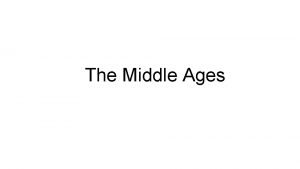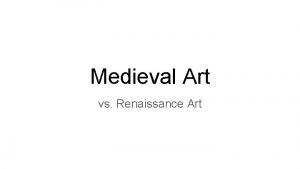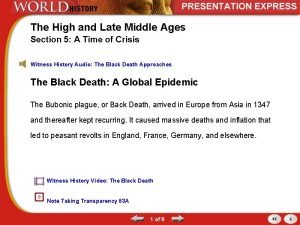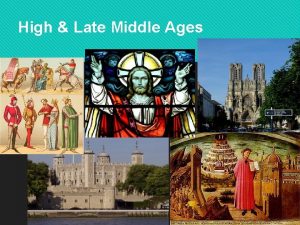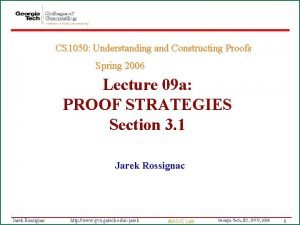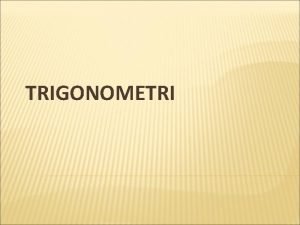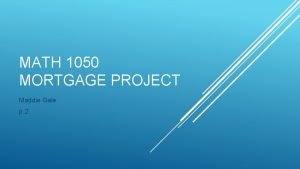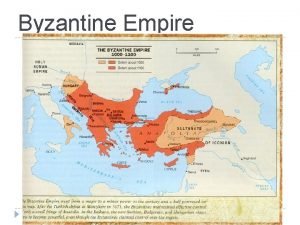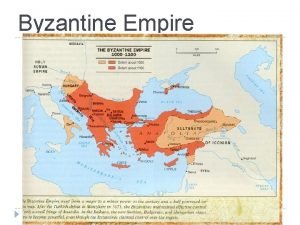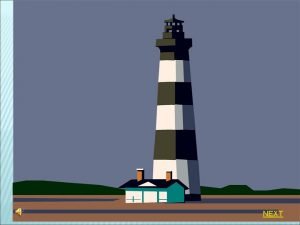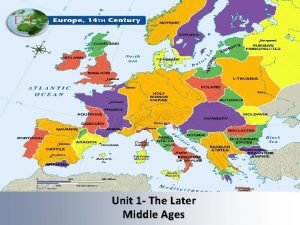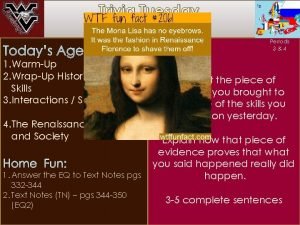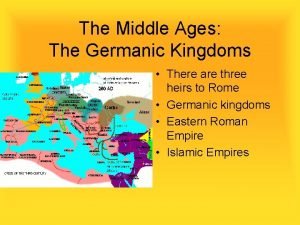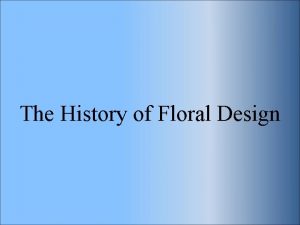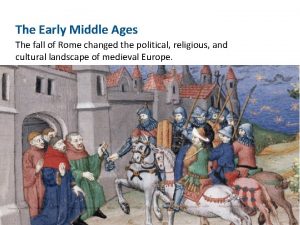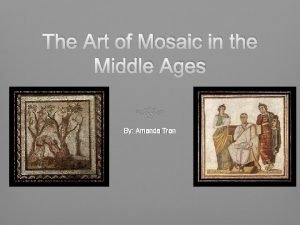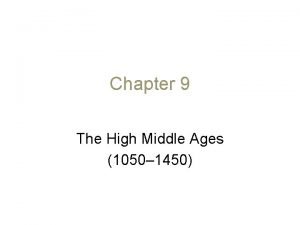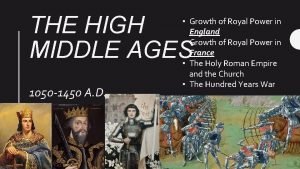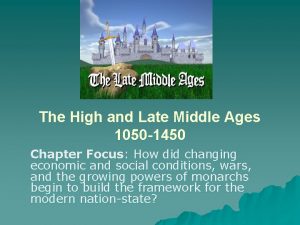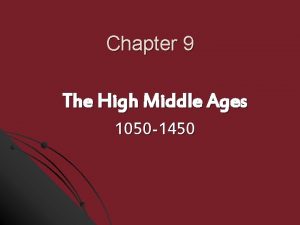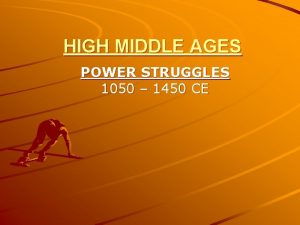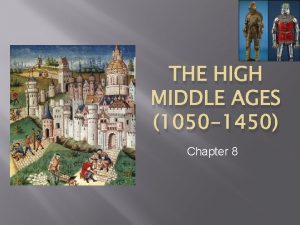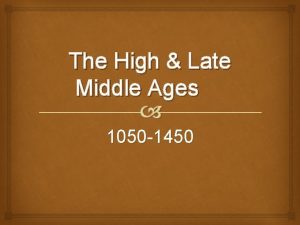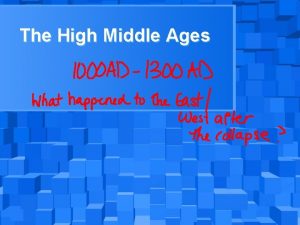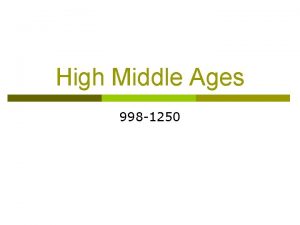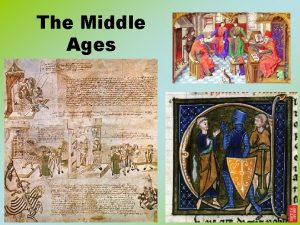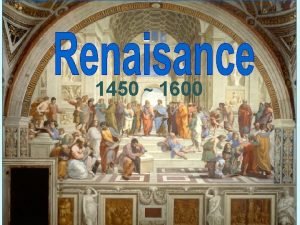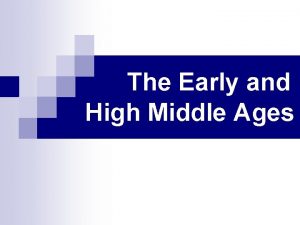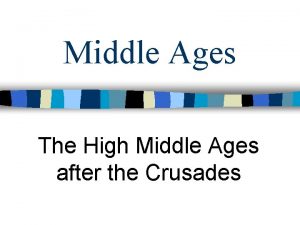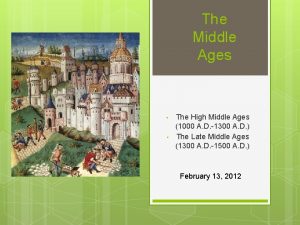The High Middle Ages 1050 1450 Growth of



















- Slides: 19

+ The High Middle Ages (1050 -1450)

+ Growth of Royal Power in England France n What are monarchs? n Monarchs struggled to exert royal authority over nobles and churchmen n Nation-state- regions that share a government that are independent of other states. n Each nation developed differently, a monarch’s success in establishing power could have consequences for centuries.

+ Monarchs and Power n Monarchs in the Middle Ages stood at the head of society but had limited power. n Who had more power than the monarchs? n Nobles and church had their own courts, collected their own taxes, and had their own armies.

+ Monarchs and Power n From 1000 -1300 monarchs began to expand their power. n Monarchs set up their own royal justice system, bureaucracy, tax system and army. n What is a bureaucracy? n Monarchs had ties with townspeople (middle class) and the townspeople supported the monarch. What does this remind you of?

+ n Why did monarchs try to centralize their power?

+ Strong Monarchs in England n Middle Ages- Angles, Saxons, and Vikings who invaded and settled in England. n How was feudalism different in England? n The Norman Conquest: n n n In 1066 the Anglo-Saxon king Edward died without an heir. Council chose Edward’s brother-inlaw Harold to rule. William, Duke of Normandy (France) was a Viking and claimed the English throne. William was supposedly promised the throne. Harold and William rival over who can claim England.

+ n What is the significance of the Battle of Hastings in 1066? n Why does William win? n William becomes known as William the Conqueror. n For 300 years after 1066 there was a blending of Norman French and Anglo-Saxon customs, languages, and traditions.

+ William the Conqueror n How does the new king of England try to centralize his control? n 1. He monitored who built castles where n 2. Domesday book- like a census n 3. Tax collection n 4. Required every vassal to swear first allegiance to him rather than their lord n 5. Granted fiefs to the Church and to his Norman lords

+ Evolution of Law and Parliament n Henry II-1154 n What did Henry do that continued to format law while still centralizing his power? n 1. Accepted customs into law n 2. Had traveling justices to enforce laws n 3. Common law- English legal system n 4. Developed a jury system

+ Conflict with Henry II and RCC n What problems emerged between Henry and the RCC? n Dispute over legal authority n Henry claimed the right to try clergy in royal courts n Thomas Becket- archbishop of Canterbury- opposed Henry n What happened to the archbishop of Canterbury? n 1170 - Murdered Thomas Becket

+ King John n King John was Henry II’s son n King John faced 3 powerful enemies: King Philip II of France, Pope Innocent III and his own English nobles. n How did he deal with each one? n n King John lost a war with Phillip II and had to give up land (Anjou and Normandy) King john battled with Innocent III on selecting a new archbishop. Pope excommunicated John. n Innocent also placed England under interdictwhole kingdom was forbade from Church services n King John and nobles- 1215 - had to sign Magna Carta. State nobles had certain rights and that the monarch must obey the law.

+ The Magna Carta n An English document where the king affirmed a long list of feudal rights. n Protected freemen from arbitrary arrests, imprisonment, and other legal actions. n Formed todays due process of law. n What is the significance of this document? n It asserted that the nobles had certain rights that would eventually be given to all English citizens. n It was clear that the monarch must obey the law.

+ Development of Parliament n During the 1200’s the Great Council evolved into Parliament n Helped to unify England- How is this possible? n The assembly of nobles, clergy, eventually middle class and the “commons” became known as the Model Parliament n In time became two house body n House of Lords and House of Commons n This was so Parliament could “check” the power of the king.


+ Monarchs in France n Successors of Charlemagne had little power over the territories ruled by the great feudal nobles. n Did not rule over a unified kingdom. n 987 - Hugh Capet of the Capetians took the throne n Built an effective bureaucracy n Collected taxes and imposed royal law over king’s lands n Gained backing of the new middle class

+ Philip Augustus n Phillip II n How did he centralize control during his reign? n Paid middle-class officials who would owe their loyalty to him n Granted many new towns a charter n New national tax.

+ Louis IX: King and Saint n Ideal of the perfect medieval monarch n Generous, noble, and devoted to justice and chivalry n How did he try to centralize power? n Expanded royal courts n Outlawed private wars n Ended serfdom

+ Philip IV: Clash with the Pope n Ruthlessly extended royal power n Tried to collect new taxes from the clergy n Clashed with Pope Boniface VIII n Avignon Papacy: n French pope elected and moved the papacy to Avignon France to ensure French kings can control religion within their own regions.

+ Successful Monarchs in France n What is the Estates General? n Legislative body made up of representative of the three estate in prerevolutionary France n Why was it set up? n How is it similar and different to England’s parliament?
 Dark ages def
Dark ages def Renaissance art vs medieval art
Renaissance art vs medieval art The high and late middle ages section 5 quiz
The high and late middle ages section 5 quiz Copyright
Copyright High middle ages
High middle ages Sahih muslim 1050
Sahih muslim 1050 Cisc 1050
Cisc 1050 Kennel dossodossi
Kennel dossodossi Cs 1050
Cs 1050 Nilai cos 1950 adalah
Nilai cos 1950 adalah Math 1050 mortgage project
Math 1050 mortgage project Byzantine empire 1050
Byzantine empire 1050 Accomplishments of the byzantine empire
Accomplishments of the byzantine empire Nyatakan dalam koordinat kartesius 10, 315 derajat
Nyatakan dalam koordinat kartesius 10, 315 derajat European middle ages map
European middle ages map Renaissance vs middle ages
Renaissance vs middle ages Germanic kingdoms
Germanic kingdoms Floral design egyptian period
Floral design egyptian period Early middle ages
Early middle ages Dark ages mosaic
Dark ages mosaic
